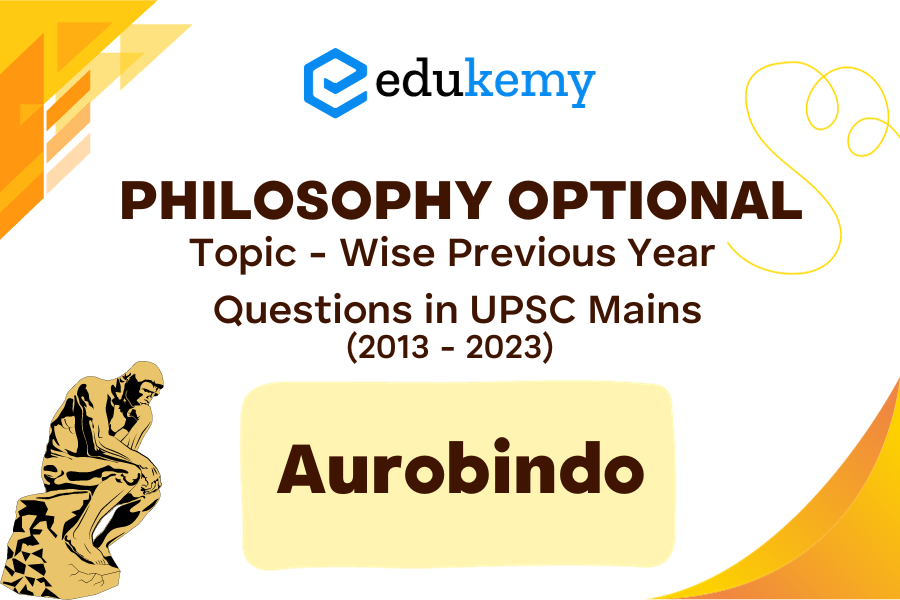
Welcome to our exploration of the philosophy optional topic for UPSC mains: Aurobindo. In the vast and intricate landscape of the UPSC Civil Services Examination, choosing the right optional subject is a crucial decision. For those with an inclination towards profound philosophical inquiries and the wisdom of visionaries, Aurobindo’s teachings and philosophy offer an intellectually stimulating choice. This blog series delves into a decade’s worth of previous year questions on Aurobindo (2013-2023) to help aspirants understand the nuances and expectations of this optional subject.
Sri Aurobindo, a multifaceted thinker, poet, and spiritual leader, left behind a legacy of philosophical ideas that continue to resonate in contemporary times. As we navigate through the past ten years of UPSC mains questions on Aurobindo’s philosophy, we will dissect his thoughts on topics such as integral yoga, spiritual evolution, human destiny, and more. By comprehending the patterns and demands of the UPSC exam through these questions, aspirants can better prepare to articulate Aurobindo’s profound insights, gaining a competitive edge in their journey to becoming civil servants. Join us on this intellectual journey to unravel the philosophical wisdom of Aurobindo and equip yourself for the challenges of the UPSC mains examination.
Contents
- 1 Aurobindo Philosophy – Previous Year Questions (UPSC CSE Mains History Optional)
- 2 FAQs on Aurobindo
- 2.1 Q: Who was Sri Aurobindo, and what are his significant contributions to philosophy?
- 2.2 Q: What is integral yoga, and how does it differ from other forms of yoga?
- 2.3 Q: What is Sri Aurobindo’s perspective on human evolution and consciousness?
- 2.4 Q: How did Sri Aurobindo’s philosophy influence the Indian independence movement?
- 2.5 Q: What are some key writings by Sri Aurobindo that I should explore to understand his philosophy better?
- 3 In case you still have your doubts, contact us on 9811333901.
Aurobindo Philosophy – Previous Year Questions (UPSC CSE Mains History Optional)
1. How does Sri Aurobindo’s integral yoga help in the realization ofsupramental consciousness ? Discuss (2017/15)
2. Discuss Aurobindo’s views on ‘Evolution’ and ‘Involution’. How dothey differ from traditional Yoga philosophy?(2016/20)
3. Sri Aurobindo’s Integral Yoga (2015/10)
4. How is Sri Aurobindo’s integral yoga is an advancement overPatajala’s yoga ? Discuss. (2014/15)
5. Explain Sri Aurobindo’s conception of cosmic salvation throughspiritual salvation of individual. (2013/10)
6. ‘Involution is the precondition of Evolution’ . Explain the role ofinvolution in the world process .(2012/15)
7. How are evolution and involution related in Sri Aurobindo’sphilosophy? (2010/15)
8. Sri Aurobindo’s conception of evolution and involution. (2008/20)
FAQs on Aurobindo
Q: Who was Sri Aurobindo, and what are his significant contributions to philosophy?
A: Sri Aurobindo was a prominent Indian philosopher, poet, and spiritual leader of the 20th century. He is best known for his concept of integral yoga, which seeks to harmonize the spiritual and material dimensions of life. His writings and teachings have had a profound influence on various philosophical and spiritual traditions.
Q: What is integral yoga, and how does it differ from other forms of yoga?
A: Integral yoga, as propounded by Sri Aurobindo, is a comprehensive path to spiritual realization. Unlike other forms of yoga that may focus on specific aspects such as physical postures (Hatha yoga) or meditation (Raja yoga), integral yoga aims to integrate all aspects of one’s being – physical, emotional, mental, and spiritual – in the pursuit of self-realization and divine consciousness.
Q: What is Sri Aurobindo’s perspective on human evolution and consciousness?
A: Sri Aurobindo believed in the concept of human evolution towards a higher state of consciousness. He posited that humans have the potential to evolve spiritually and manifest a divine consciousness, transforming not only individual lives but also the collective destiny of humanity.
Q: How did Sri Aurobindo’s philosophy influence the Indian independence movement?
A: Sri Aurobindo was an early freedom fighter and played a significant role in the Indian independence movement against British colonial rule. He combined his spiritual and philosophical insights with political activism, advocating for the cause of India’s independence and self-determination.
Q: What are some key writings by Sri Aurobindo that I should explore to understand his philosophy better?
A: Some of Sri Aurobindo’s most notable works include “The Life Divine,” where he elaborates on his philosophy of integral yoga and the evolution of consciousness, and “Savitri: A Legend and a Symbol,” an epic poem that explores the spiritual journey of the soul. These works provide valuable insights into his philosophical and spiritual ideas.
In case you still have your doubts, contact us on 9811333901.
For UPSC Prelims Resources, Click here
For Daily Updates and Study Material:
Join our Telegram Channel – Edukemy for IAS
- 1. Learn through Videos – here
- 2. Be Exam Ready by Practicing Daily MCQs – here
- 3. Daily Newsletter – Get all your Current Affairs Covered – here
- 4. Mains Answer Writing Practice – here

